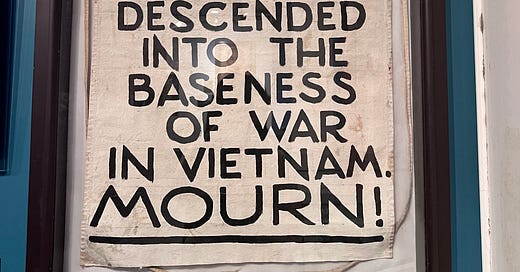Alternative history
Growing up in the once-DMZ taught me a thing or two about war (and anti-war activism)
Dear friends,
A person, maybe a student of foreign policy, asked two speakers about how to make Vietnamese people pay more attention to Israel's war on Palestine (I translated from Vietnamese using Al Jazeera’s term here).
It was a roundtable, happening at a Hanoi independent library, of two writers and a young intellectual on not only what was (is!!) going on in the Gaza Strip but also the land history dating back to the 19th century.
Sáng Ánh or Đỗ Kh. – my favorite author – was one of the guest speakers who drew me there. I learned about the Middle East solely from his writings on soi.today and Tuoi Tre Weekly.
When I say I don’t know much about the military conflict, it doesn't mean I’m arrogant or the killing of innocent people doesn’t evoke any particular emotions in me. At the end of the day, it’s a livestreamed war where “politically correct” narratives no longer stay in institutional newsrooms’ style guides.
I was not familiar with Middle East disputes and only started doing research after October 7, 2023. A student of diplomacy myself, I have been interested mostly in the Greater Mekong Subregion, US and East Asia. Why? Simply because their impacts on Vietnam are palpable.
That leads back to the original (and somehow naive) question of the mentioned student: what makes an effective anti-war activism movement?
Relevance – either an aspiring future or transgenerational trauma – makes.
Examining a post by vietforpalestine – a Vietnamese Instagram account calling for ceasefire in the Gaza Strip – in which the author claims “Palestine is Vietnam of the past – Protecting Palestine is loving your own past”, we can see the demonstration of relevance reflected in the comparison of Palestine’s status quo and disasters Vietnamese people suffered during the resistance war against French colonialism and Japanese occupation as well as the 1945 famine.
An effort to explore relevance, however, stops making sense when, in the next couple of slides, examples of the Vietnam War also known as the US Resistance War, are showcased. The post ends with the image of the North Vietnamese army tank entering Independence Palace, marking the Fall of Saigon on April 30, 1975.
Let us take a couple of minutes to dig into Vietnamization – a program by the US to switch war responsibility to South Vietnam and gradually end involvement starting from 1969.
Since examples are textbook-alike – an official history with the rights and wrongs, the post fails to establish relevance in me – a person being born and growing up in the once DMZ where people came from both sides of the 17th parallel, where at least half of the local population didn’t stand on the favored side of history.
What I can suggest to them – vietforpalestine account owner and the person – is to look into alternative history – go asking people what they feel seeing pictures/moving images from Gaza.
In 2021, there was a call on Facebook for an oral history archive titled “The Pandemic Memories” in which people can send over messages or voice notes during the height of COVID-19 second wave in Vietnam.
Community sourced stories, either hopeful or desperate, were not 100% in sync with what were reported on the state-controlled media. Nevertheless, they displayed to people, behind screens, in quarantine or hospitalized, the sense of “we’re all in this together”.
Human warmth, isn’t it what pushes us through long cold nights of cruelty?
Till next time,
T.
P/S:
I saw this poster in the Vietnamese Women’s Museum in Hanoi, made by Australian anti-war activists as far as I remember.
This week’s top picks
In response to two cases of child sexual abuse and office sexual harrassment in Vietnam recently:
The SCUM Manifesto by Valerie Solanas (introduced to me by my favorite person on earth):
https://www.khoury.northeastern.edu/home/shivers/rants/scum.html
A moving movie on teenage abortion
and an empowering one
For folks in Hanoi this week:



